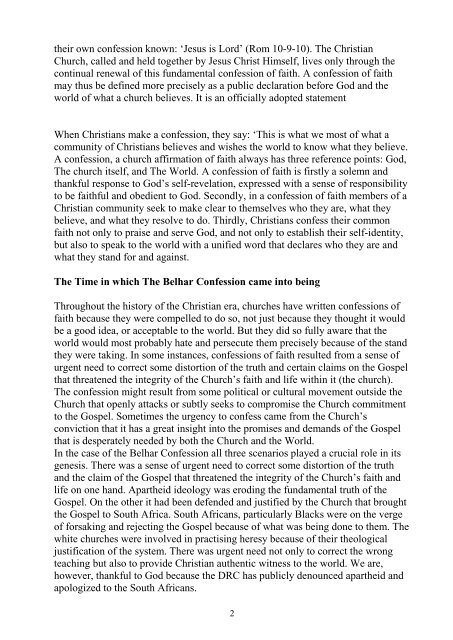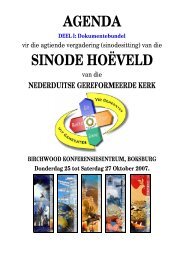belhar confession yesterday, today and tomorrow: prof st kgatla
belhar confession yesterday, today and tomorrow: prof st kgatla
belhar confession yesterday, today and tomorrow: prof st kgatla
You also want an ePaper? Increase the reach of your titles
YUMPU automatically turns print PDFs into web optimized ePapers that Google loves.
their own <<strong>st</strong>rong>confession</<strong>st</strong>rong> known: ‘Jesus is Lord’ (Rom 10-9-10). The Chri<strong>st</strong>ianChurch, called <<strong>st</strong>rong>and</<strong>st</strong>rong> held together by Jesus Chri<strong>st</strong> Himself, lives only through thecontinual renewal of this fundamental <<strong>st</strong>rong>confession</<strong>st</strong>rong> of faith. A <<strong>st</strong>rong>confession</<strong>st</strong>rong> of faithmay thus be defined more precisely as a public declaration before God <<strong>st</strong>rong>and</<strong>st</strong>rong> theworld of what a church believes. It is an officially adopted <strong>st</strong>atementWhen Chri<strong>st</strong>ians make a <<strong>st</strong>rong>confession</<strong>st</strong>rong>, they say: ‘This is what we mo<strong>st</strong> of what acommunity of Chri<strong>st</strong>ians believes <<strong>st</strong>rong>and</<strong>st</strong>rong> wishes the world to know what they believe.A <<strong>st</strong>rong>confession</<strong>st</strong>rong>, a church affirmation of faith always has three reference points: God,The church itself, <<strong>st</strong>rong>and</<strong>st</strong>rong> The World. A <<strong>st</strong>rong>confession</<strong>st</strong>rong> of faith is fir<strong>st</strong>ly a solemn <<strong>st</strong>rong>and</<strong>st</strong>rong>thankful response to God’s self-revelation, expressed with a sense of responsibilityto be faithful <<strong>st</strong>rong>and</<strong>st</strong>rong> obedient to God. Secondly, in a <<strong>st</strong>rong>confession</<strong>st</strong>rong> of faith members of aChri<strong>st</strong>ian community seek to make clear to themselves who they are, what theybelieve, <<strong>st</strong>rong>and</<strong>st</strong>rong> what they resolve to do. Thirdly, Chri<strong>st</strong>ians confess their commonfaith not only to praise <<strong>st</strong>rong>and</<strong>st</strong>rong> serve God, <<strong>st</strong>rong>and</<strong>st</strong>rong> not only to e<strong>st</strong>ablish their self-identity,but also to speak to the world with a unified word that declares who they are <<strong>st</strong>rong>and</<strong>st</strong>rong>what they <strong>st</strong><<strong>st</strong>rong>and</<strong>st</strong>rong> for <<strong>st</strong>rong>and</<strong>st</strong>rong> again<strong>st</strong>.The Time in which The Belhar Confession came into beingThroughout the hi<strong>st</strong>ory of the Chri<strong>st</strong>ian era, churches have written <<strong>st</strong>rong>confession</<strong>st</strong>rong>s offaith because they were compelled to do so, not ju<strong>st</strong> because they thought it wouldbe a good idea, or acceptable to the world. But they did so fully aware that theworld would mo<strong>st</strong> probably hate <<strong>st</strong>rong>and</<strong>st</strong>rong> persecute them precisely because of the <strong>st</strong><<strong>st</strong>rong>and</<strong>st</strong>rong>they were taking. In some in<strong>st</strong>ances, <<strong>st</strong>rong>confession</<strong>st</strong>rong>s of faith resulted from a sense ofurgent need to correct some di<strong>st</strong>ortion of the truth <<strong>st</strong>rong>and</<strong>st</strong>rong> certain claims on the Gospelthat threatened the integrity of the Church’s faith <<strong>st</strong>rong>and</<strong>st</strong>rong> life within it (the church).The <<strong>st</strong>rong>confession</<strong>st</strong>rong> might result from some political or cultural movement outside theChurch that openly attacks or subtly seeks to compromise the Church commitmentto the Gospel. Sometimes the urgency to confess came from the Church’sconviction that it has a great insight into the promises <<strong>st</strong>rong>and</<strong>st</strong>rong> dem<<strong>st</strong>rong>and</<strong>st</strong>rong>s of the Gospelthat is desperately needed by both the Church <<strong>st</strong>rong>and</<strong>st</strong>rong> the World.In the case of the Belhar Confession all three scenarios played a crucial role in itsgenesis. There was a sense of urgent need to correct some di<strong>st</strong>ortion of the truth<<strong>st</strong>rong>and</<strong>st</strong>rong> the claim of the Gospel that threatened the integrity of the Church’s faith <<strong>st</strong>rong>and</<strong>st</strong>rong>life on one h<<strong>st</strong>rong>and</<strong>st</strong>rong>. Apartheid ideology was eroding the fundamental truth of theGospel. On the other it had been defended <<strong>st</strong>rong>and</<strong>st</strong>rong> ju<strong>st</strong>ified by the Church that broughtthe Gospel to South Africa. South Africans, particularly Blacks were on the vergeof forsaking <<strong>st</strong>rong>and</<strong>st</strong>rong> rejecting the Gospel because of what was being done to them. Thewhite churches were involved in practising heresy because of their theologicalju<strong>st</strong>ification of the sy<strong>st</strong>em. There was urgent need not only to correct the wrongteaching but also to provide Chri<strong>st</strong>ian authentic witness to the world. We are,however, thankful to God because the DRC has publicly denounced apartheid <<strong>st</strong>rong>and</<strong>st</strong>rong>apologized to the South Africans.2
















